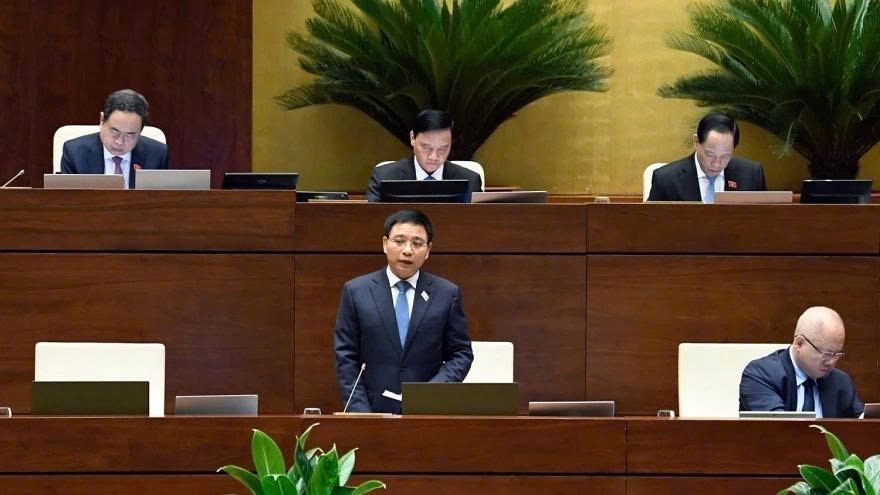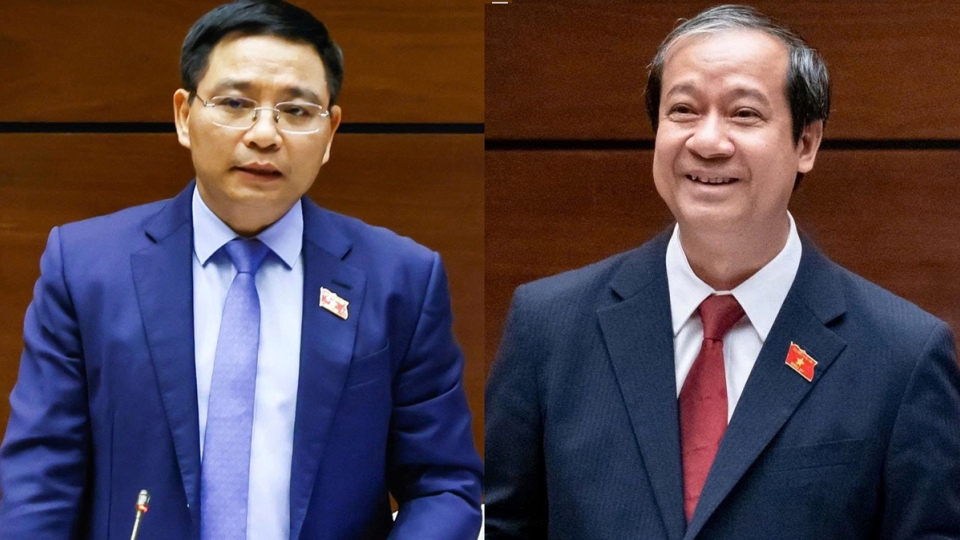Finance Minister outlines business growth, investment disbursement plans
VOV.VN - Minister of Finance Nguyen Van Thang outlined key solutions at the National Assembly’s question time in Hanoi on June 19, aimed at promoting business development, enhancing competitiveness, and accelerating public investment to support sustainable economic recovery.

A transparent and business-friendly environment in need
Taking the floor, National Assembly deputy Dang Bich Ngoc of Hoa Binh province pointed to the fact that the number of businesses exiting the market in Vietnam continues to rise, and business production and operations face many difficulties, putting pressure on the goal of having 2 million active enterprises in the economy by 2030. She requested the minister to share solutions to realise the goal of developing enterprises both in terms of quantity and quality in the upcoming period.
In response, Thang agreed that the first half of 2025 has seen a high number of enterprises shut down, reflecting the difficulties in accessing capital, land, and administrative procedures. Achieving the national target of two million operational businesses by 2030 as stated in the Party’s Resolution 68-NQ/TW is becoming increasingly challenging.
However, it also demands decisive and coordinated action in the face of both internal and external challenges, he said.
To do this, he said, it’s imperative to create a transparent and business-friendly environment by removing market entry and operational barriers; substantively streamlining administrative procedures and cutting compliance costs; and reforming business licensing requirements and promoting digital transformation in government services.
The Minister stated that more than 5 million household businesses transitioning into enterprises represent the largest potential force to realise the goal of 2 million enterprises. To promote the transition process, the Ministry of Finance is reviewing and improving methods to narrow the gap between household businesses and enterprises in terms of management, finance, and accounting. It is implementing the policy to abolish the lump-sum tax regime starting from 2026, thereby encouraging transparency and professionalisation.
In addition, he said, the Ministry of Finance will help to enhance enterprise resilience and competitiveness, by facilitating business access to land, capital, markets, technology, digital transformation, and human resource development, with a primary focus on micro, small, and medium-sized enterprises (MSMEs) that are most vulnerable to market fluctuations. The goal is unlocking bottlenecks and supporting businesses to enhance their resilience and adaptability, thereby reducing the number of enterprises exiting the market, he said.
Removing bottlenecks to accelerate investment disbursement
National Assembly deputy Tran Thi Kim Yen of Ho Chi Minh City raised concerns about slow public investment disbursement, saying despite efforts the disbursement rate remains low.
“People are still complaining that money is available but cannot be used,” she said, asking the Minister to introduce solutions aimed at accelerating the disbursement, thus helping to achieve the 8% GDP growth target this year.
Thang acknowledged that although funding is available, implementation bottlenecks continue to pose challenges. He cited statistics saying in the first five months of 2025, nearly VND200 trillion in public investment was disbursed, meeting 24.1% of the annual plan, an increase of 22% year on year. All major national projects reportedly met or surpassed their scheduled timelines.
Nevertheless, several obstacles remain, including overlapping legal regulations, delays in project preparation, shortages of construction materials, and limited capacity within some local project management units.
To address the issue, the Minister proposed amending the Public Investment Law to strengthen decentralisation and eliminate procedural and regulatory obstacles related to land, construction, and planning. He also highlighted the need to link disbursement results to the performance assessments of agencies and officials, and enhance the role of steering committees to ensure timely oversight and intervention, especially for large-scale and priority projects.
Using AI to detect tax evasion on e-commerce platforms
National Assembly deputy Nguyen Huu Thong of Binh Thuan province expressed his concerns about tax management on digital platforms and e-commerce, citing significant difficulties and tax evasion that impact state budget revenues.
“This creates unfair competition for household businesses, small traders, and supermarkets. What are the Ministry of Finance’s fundamental solutions to address this issue?” he asked.
In response, Thang affirmed that the Ministry of Finance has been taking strong measures to manage tax on digital and e-commerce platforms to prevent losses and ensure fairness. Notable efforts include issuing regulations on electronic invoicing, tax obligations of e-commerce platforms, and allowing individual businesses to authorise platforms to issue e-invoices and identify online sales invoices across social media.
The Ministry has also launched a digital tax filing and payment portal, with a particular focus on applying information technology and artificial intelligence (AI) in tax administration for e-commerce.
To date, 95% of the national population database has been standardised and integrated with banks and e-commerce websites. Currently, 158 foreign suppliers are declaring and paying taxes in Vietnam, contributing VND23 trillion in tax revenue. Around 106,000 household businesses have declared and paid VND1.2 trillion in taxes.
Thang noted that tax revenue from e-commerce in the first five months of the year grew by 55%, reaching over VND75 trillion. The Ministry will continue fine-tuning regulations, clearly defining e-commerce activities, identifying business entities involved, guiding tax declaration and payment, and upgrading digital platforms.
“We will increase the use of AI to detect tax fraud among individuals and organisations trading and earning income on e-commerce platforms and digital channels,” he said.





